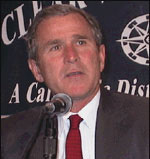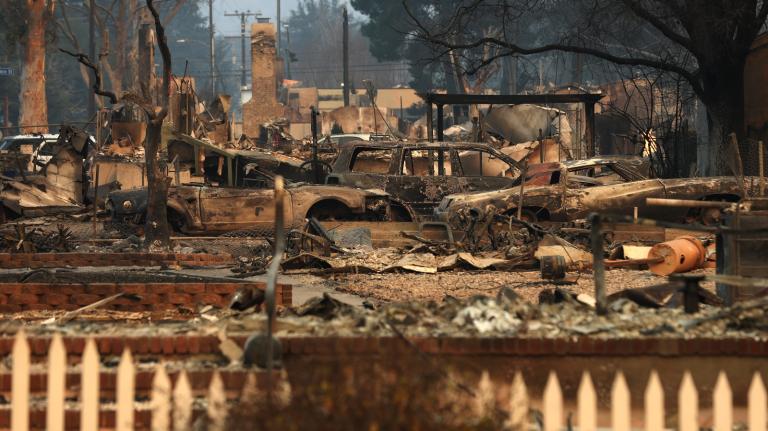Jeff Seabright, executive director of the White House Task Force on Climate Change, is bailing out in the waning days of the Clinton administration for a plum job in the private sector, namely as vice president for policy planning at Texaco.
Muckraker had been hearing rumblings of the imminent departure for a week, but couldn’t get calls returned by Seabright or task force spokesperson Paul Bledsoe.
Lo and behold, the call confirming the move came through on Wednesday, which just happened to be the same day Texaco officially announced Seabright’s hiring.
In their press release, the company said Seabright “will be responsible for working with internal and external stakeholders to develop strategic initiatives on key public policy and corporate governance issues. Working with the company’s business units, he will also assist in the design of effective implementation mechanisms for these strategies.”
Care to try translating that gobbledygook into English? Email your attempts to muckraker@gristmagazine.com.
Reaction to Seabright’s move essentially broke down along two lines.
One group argued that the addition of Seabright to the Texaco corporate masthead is one more indication that the company, among the many to quit the pro-industry Global Climate Coalition in recent months, is actually serious about implementing more environmentally friendly policies and working cooperatively with the federal government.
Another group argued that those in the first group must be smoking something. They say it’s nothing but corporate sellout with a capital S.
“We often wonder why the Clinton administration is so bad on global warming,” said Ozone Action Executive Director John Passacantando, an affirmed member of the second group. “Things like this give us little glimpses why.”
David Gardiner, who had been the number two on the task force, will take over and keep the executive director’s chair warm. Prior to joining the task force in July of last year, Gardiner had been assistant administrator for policy at EPA, where he led the agency’s climate change efforts. Before joining the administration in 1993, he was legislative director at the Sierra Club.
Southwestern Salsa
As promised, we return this week to our region-by-region look at hot contests for House, Senate, and governor this fall. This week’s tour takes us to the Southwest, home to many critical environmental issues, from saving the Rio Grande to closing a pumice mine on land sacred to Native Americans.
Arizona: Things should be fairly quiet in the Grand Canyon state this fall. Sen. Jon Kyl (R) is up for reelection but is not expected to get much of a challenge.

In the House, the only suspense appears to be which Republican will succeed retiring Rep. Matt Salmon (R). Top hopefuls include telecommunications executive Susan Bitter Smith, former Goldwater Institute Director Jeff Flake, and Tom Liddy, former legal counsel to the Republican National Committee.
There is a Democrat in this race, even though few expect him to win. David Mendoza, a union official who lost to Salmon by nearly 50,000 votes in 1998, announced late last month that he would take a second shot at the seat.
New Mexico: It’s all about the Albuquerque-based 1st congressional district this year, where the absence of a Green Party candidate means Democrats have a shot at knocking off first-term Republican Rep. Heather Wilson.

Democrats have to survive their own June 6 primary, however, in which four candidates (none the party’s top choice for the race) are battling for the right to take on Wilson.
The environment has already emerged as a major issue as the four Dems — former Albuquerque City Councilor Sam Bregman, former U.S. attorney John Kelly, former state Rep. Bob Perls, and attorney John Wertheim — have challenged one another on their green credentials.
In a recent debate, Wertheim criticized Kelly for working at a law firm that has defended oil and gas interests. Bregman and Perls, meanwhile, agreed during the debate that protecting the Rio Grande should be the most important issue in the race, while Kelly countered that preserving petroglyphs and saving the endangered silvery minnow should top the agenda.
The race probably leans toward Wilson, a moderate and likable legislator, but without a Green to siphon away votes (Robert L. Anderson of the Green Party took 10 percent in 1998 when Wilson won by only 6 points over a very weak Democrat), there is no reason the Democratic nominee should be anything but highly competitive.
Oklahoma: As in New Mexico, all political eyes in the Sooner State will focus on a single congressional district, in this case the Muskogee-based 2nd, which features a heavy concentration of Native American voters.

It’s a hazy picture now, as both parties have crowded fields for the Sept. 19 primary.
The Democratic field is led by former White House fellow Brad Carson and state Rep. Bill Settle, a veteran Oklahoma pol who chairs the state House appropriations committee.
The Republican side is even more crowded. Retiring incumbent Tom Coburn has endorsed auto dealer Andy Ewing, but Ewing may have trouble escaping a late-September runoff that could leave him at a disadvantage to the Democratic nominee. That could spell particular trouble in a district long controlled by Democrats that voted heavily for President Clinton in both 1992 and 1996.
New Mexico will also be in play at the presidential level. Clinton carried it twice, but it went for George Bush in 1988 and is no lock for Al Gore this year.
Texas: Unlike New Mexico, the Lone Star State is off the table at the presidential level, with its favorite son leading the Republican ticket.
But there should be at least a couple of good House races.

Democrats think they recruited the perfect candidate in attorney Regina Montoya Coggins to defeat Republican Pete Sessions in the Dallas-based 5th district. Coggins, who has been a television commentator and worked in the Clinton White House, has raised close to a million dollars and had over half a million in the bank as of March 31.
Coggins clearly plans to make Sessions’s environmental record an issue in the campaign (he received a score of 0 from the League of Conservation Voters in 1998). On Earth Day, when Sessions stopped by a Dallas elementary school to help students work on a new pond and gardens, Coggins’s campaign manager Chris Turner told the Dallas Morning News: “This guy has one of the worst environmental voting records in the House of Representatives. … A more appropriate thing would be for the students who have been studying about the environment and Earth Day to teach the congressman a little something about clean water and clean air. That would be a better use of their time.”
The other po
tentially competitive district in Texas is the 14th, where Democrats will try to defeat Rep. Ron Paul (R), a surgeon who once ran for president as a libertarian.
Rice farmer Loy Sneary will try once again to unseat Paul in the rural Gulf Coast district, but Washington handicappers expect Paul to survive, particularly in a year with a Texas Republican at the top of the ticket.
The Scarlett Letter
Avid readers of the New York Times op-ed page noticed a new voice this week lauding George W. Bush as an underestimated defender of the environment, whose record is “far better than activists allow.”

Texas’s favorite son.
The author, Reason Public Policy Institute Director Lynn Scarlett (who is also a Bush advisor, though the Times neglected to mention this), reiterated many of the points becoming familiar to those who pay close attention to the rhetorical debate over Dubya’s green credentials.
The basic arguments are these: Air quality is indeed bad in Texas, but only because the state produces much of the nation’s oil and oil-based chemicals. Call this the “Texas makes, the nation takes” argument. The second point is that air quality is bad mainly because Bush’s predecessors didn’t do much about it. The third argument is that Bush has sponsored new emissions regulations for older industrial plants that are grandfathered under previous laws — and the regs are not entirely voluntary, as environmental critics often claim.
Finally, Scarlett argues, Bush expanded a program begun under Democratic Gov. Ann Richards that encourages companies to reduce their toxic waste in order to receive “a special environmental logo,” and he improved on a number of incentive-based programs encouraging companies to reduce emissions and individuals to protect wildlife.
It all amounts to a “new environmentalism,” according to Scarlett, that relies not on government mandates but on incentives and voluntary agreements because, after all, “most people and most companies want to do the right thing.”
Texas A&M oceanography professor Thomas J. Crowley fired off the first in what are likely to be many volleys back and forth over the merits of Scarlett’s arguments in a Letter to the Editor published just a day after Scarlett’s piece appeared.
“It is hard to believe that Lynn Scarlett’s supportive description of George W. Bush’s environmental program in Texas applies to the state where I live,” Crowley wrote. “What we have here is reckless industrial development, with virtually no concern for the environment.
“Houston has surpassed Los Angeles as the most polluted city in the nation. Industry cooperation in reducing the poisoning of the chemical stew that passes for an atmosphere around Houston is a joke; industries moved there because there are few regulations (especially of state origin), and their powerful lobbyists have a firm grip on the governor to keep things that way.”

